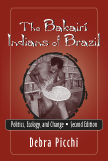“Readable and comprehensive coverage of the impacts of economic expansionist policy and imperialism on small-scale indigenous human populations. Must-read for students of cultural anthropology, economics, and political science.” — Ryan Ellsworth, Southeast Missouri State University
“I like to compare a horticultural society in transition to foragers in transition in my introductory anthropology classes. Picchi does a nice job of balancing descriptions of change within traditional concepts like kinship that allow for comparison with other ethnographies.” — David Casagrande, Western Illinois University
“This is a valuable study of social change among an indigenous group in South America. The ethnographic detail is rich, and the tables document details in the behavior system. This monograph gives important coverage of social organization, work, dance and ceremony, and the relationships with the larger society in Brazil. The discussion of fieldwork is useful, and I like the mixture of photographs, charts, and maps. This is one of the best ethnographies of an Amazonian indigenous group.” — Ronald J. Duncan, Oklahoma Baptist University
“Picchi’s book reminds us of the value of long-term fieldwork and theoretically informed ethnographies . . . I consider it very rich and useful as it will introduce its readers to key debates in contemporary anthropology.” —Journal of Political Ecology
“I have been searching for an introductory level, full-length (but not too long) ethnography dealing with a traditional society, preferably South American Indians. This book works well as a replacement for the problematic Yanomamö, with its ethical problems and blatant sexism, and is a useful corrective for a critical discussion of Chagnon’s book. It provides a historical perspective as well as an important environmental focus. The discussion questions at the end are fabulous.” —Benjamin Feinberg, Warren Wilson College
“A very useful, readable text. I hope to incorporate it into the reading for my ecological anthropology course.” —Janice Chism, Winthrop University
“Wonderful insights into the lives of the Bakairí by an experienced anthropologist. The self-contained learning guide is a great resource for students and will help them get the most out of the book.” —Jeffrey P. Blick, Georgia College and State University
“This is a timely and effective case study, useful for both introductory courses as well as intermediate-level courses on human ecology, development, or Latin America.” —Jonathan G. Andelson, Grinnell College
“I liked this ethnography, especially the beginning section since it gave students a perspective on what/why/how. Clearly written, interesting, and well priced.” —Mary Beth Trubitt, Henderson State University
Picchi does an excellent job of making this Amazonian ethnography both accessible and rigorous. She packs a lot of information into a slim volume and her study guide at the end is very well done.” —Flora E-Shen Lu, Stanford University

230 pages, $30.95 list
1-57766-430-2
978-1-57766-430-7
© 2006
paperback
Self-contained student study guide
eBook availability
The Bakairí Indians of Brazil
Politics, Ecology, and Change
Second Edition
For over twenty-five years, Debra Picchi has documented how the Bakairí Indians have addressed and endured change. This up-close portrayal of how a remarkable indigenous people of Brazil has managed to hold on to many of their traditions after years of contact with mainstream Brazilian culture is written in a down-to-earth, conversational style, yet does not avoid complex issues. The original edition represented one of the first ethnographies on South American Indians to espouse political ecology explicitly as a theoretical orientation.
Expanded coverage in the second edition includes material on the theory of political ecology, different methodological approaches used to collect data on populations, the latest archaeological findings taking place in Brazil, how Bakairí gender constructs have changed over the last 100 years, and the effects of population increases, mechanized production, and wealth accumulation. Both accessible and rigorous, Picchi packs much information into a slim volume, which serves as a reminder of the value of long-term fieldwork and demonstrates that research is as much about process as it is about product.
Expanded coverage in the second edition includes material on the theory of political ecology, different methodological approaches used to collect data on populations, the latest archaeological findings taking place in Brazil, how Bakairí gender constructs have changed over the last 100 years, and the effects of population increases, mechanized production, and wealth accumulation. Both accessible and rigorous, Picchi packs much information into a slim volume, which serves as a reminder of the value of long-term fieldwork and demonstrates that research is as much about process as it is about product.
Reactions
1. Beginning Fieldwork
2. A Theoretical Framework and Methodology
3. The Changing World of the Bakairí Indians
4. Bakairí Demography: Households, Fertility, and Mortality
5. Making a Living Bakairí Style
6. Living and Working in Groups
7. Bakairí Gender Constructs in Modern Times
8. The Bakairí and Their Dancing Masks
9. Leading the Bakairí in the Twenty-first Century
10. Projections and Conclusions about the Bakairí’s Future
11. The Bakairí: Indians, Ethnic Minority, or Both?
Study Guide
2. A Theoretical Framework and Methodology
3. The Changing World of the Bakairí Indians
4. Bakairí Demography: Households, Fertility, and Mortality
5. Making a Living Bakairí Style
6. Living and Working in Groups
7. Bakairí Gender Constructs in Modern Times
8. The Bakairí and Their Dancing Masks
9. Leading the Bakairí in the Twenty-first Century
10. Projections and Conclusions about the Bakairí’s Future
11. The Bakairí: Indians, Ethnic Minority, or Both?
Study Guide